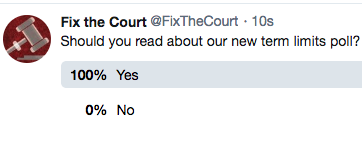In Spite of Contentious Confirmations, New FTC Poll Shows Americans United on Ending Life Tenure at the High Court
Plus Democrats Say They’d Prefer Term Limits to Court-Packing If They Win Big in 2020
*** Results here ***
 Americans have deeply divided views on the Supreme Court confirmation process yet are united across party and regional lines on ending life tenure at the high court, according to a new poll released today by Fix the Court.
Americans have deeply divided views on the Supreme Court confirmation process yet are united across party and regional lines on ending life tenure at the high court, according to a new poll released today by Fix the Court.
When asked, “Would you support or oppose restrictions on length of service for U.S. Supreme Court justices, for example, setting a retirement age or capping total years of service?” an astounding 78% say they back such restrictions, with only 22% opposed (p. 3).
Supporting an age or length-of-service cap are 81% of self-identified Democrats and 76% of self-identified Republicans and Independents, with a relatively even amount of agreement across the country, as well, ranging from 73% in the Northeast to 81% in the South.
When asked, “Which comes closer to your view: the Supreme Court nomination and confirmation process is broken, or [it’s] working as our nation’s founders intended?” respondents overall chose “broken,” 58%-42%. Not surprisingly, though, Democrats say 75%-25% that the process is broken, while Republicans say the opposite by a 65%-35% margin (p. 3).

Polling firm PSB conducted online interviews Oct. 19-22 on FTC’s behalf among 1,000 likely midterm election voters.
The most illuminating question may have been the final one. PSB asked self-identified Democrats to imagine their party won the White House and Congress in 2020 and that “elected officials [would] consider making institutional changes” to the court. Of the following, which did they prefer: adding term limits so that any new justice could only serve up to 18 years or adding additional justices to counterbalance those picked by President Trump?
Despite the recent hubbub around court-packing, Democrats say they prefer term limits, 58%-42% (p. 4).
“Had the Founders known that one day Supreme Court justices would serve for monarchic 30 or 35 years, they might have considered defining what constitutes ‘good behavior’ in Article III of the Constitution,” FTC executive director Gabe Roth said. “Thankfully, there is now consensus across party lines that our elected officials should do something to change these interminable tenures, and we’ll be working with Congress to make that happen.”
“As our political environment becomes increasingly more polarized, it would be wise to replace lifetime judicial appointment with long-tenure terms, a modest reform that Americans of every description and political party enthusiastically support,” PSB Principal Robert Green said.
The results come on the heels of Justice Elena Kagan telling a Georgetown University Law Center audience that she wouldn’t rule out term limits as prudent policy.
“Could you do [Supreme Court tenure] with sufficiently long terms – 18 years seems to be the going proposal – maybe,” she hypothesized at the Oct. 24 event. “I think that what those proposals are trying to do is to take some of the high stakes out of the confirmation process, and certainly to the extent that that worked, and that people could feel as though no single confirmation was going to be a life or death issue, that that would be a good thing. So I think it’s a balance among good goals.”
Two years ago, Justice Stephen Breyer said term limits would be “fine” so long as “there were a long term – I don’t know, 18, 20 years, something like that.” To learn more about Fix the Court’s term limits proposal, visit FixTheCourt.com/TermLimits.
Poll methodology:
PSB conducted online interviews Oct. 19-22, 2018, among 1,000 U.S. likely midterm election voters. The margin of error for this study is +/- 3.1% at the 95% confidence level and larger for subgroups.